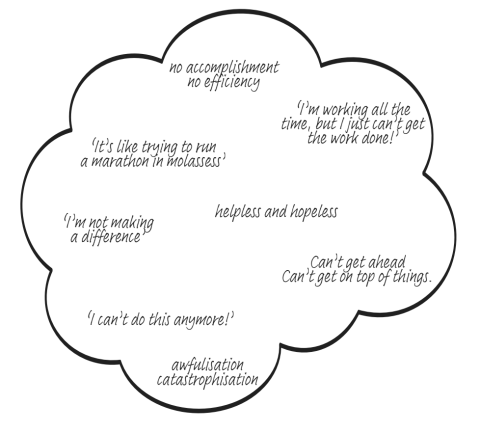The third red flag of burnout: Reduced personal accomplishment or professional efficacy

Because burnout is a gradual process, it can often to be tricky to spot. Luckily, there are three signs, or symptoms, of burnout. I like to call these signs the ‘red flags of burnout’. They are:
- chronic exhaustion,
- cynicism or depersonalisation,
- and a reduced sense of accomplishment or professional efficacy.
I’ve already covered the first two red flags in previous blogs, which you can read here and here. Today, I’m unpacking the third and final red flag in this exclusive excerpt from my book, Beyond Burnout.
RED FLAG #3: REDUCED PERSONAL ACCOMPLISHMENT AND A LACK OF PROFESSIONAL SELF-EFFICACY

Perhaps my biggest sign of burnout was a growing sense of not achieving anything much at all at work. I was in quicksand, sinking lower and lower into a smothering pit of inefficacy. Suddenly, for the first time in my professional life, I felt as if I didn’t have the necessary resources or ability to do what was required of me.
I’d been an achiever my whole career. I was used to being on top. But I was not on top now. My performance was slipping away as quickly as my enthusiasm. I came to dread the weekly phone calls with Nick, my manager, which I had previously looked forward to with enthusiasm.
Burnout brings with it an increasing feeling of not accomplishing anything worthwhile at work. As you can imagine, this can be pretty soul-destroying, especially if you’re used to achieving or you’re passionate about the work you do.
When people who are suffering from burnout start to show this third symptom, and feel that it’s increasingly difficult to accomplish what they’re supposed to at work, it can be crippling.
There’s an increasing feeling of not getting ahead or making headway, or that the work is becoming overwhelming and too challenging — even when previously this wasn’t the case. A feeling that you’re no longer having an impact is one of the most damaging signs of burnout, especially when you consider that one of the key motivators people strive for at work is making a difference.
It’s no surprise that this can be a self-fulfilling prophecy. A sense of reduced personal accomplishment can be incredibly demotivating. This demotivation then leads to no enthusiasm and a loss of will to do the job. And yes, that self-fulfilling prophecy comes full circle — voilà, poor performance.
When I was in the midst of burnout, I won a big account for our firm. Usually, this would have had me dancing around our office and feeling proud of my accomplishment. But instead of feeling excitement and professional pride, I felt an overwhelming sense of dread about how I was going to deliver this project. I didn’t feel like my team or I could do what was needed for this new key account we’d just landed. This major new client was a ten-kilo bag of cement slung around my shoulders when I was already knee-deep in mud, just trying to get to the finish line.
This reduced professional efficacy also came through in those people I interviewed for this book. For instance, Jenny noted:
‘My brain was just constantly worried about what was going to happen next and how I was going to get all of those things done. And I was very inefficient, I think, because of that. If I had been worried at any point about patient safety I would’ve stopped. But I wasn’t getting the same sense of satisfaction about what I was doing. I never felt I was good enough, but I didn’t feel bad enough to not be doing it.’
SOME QUESTIONS WHICH MAY INDICATE A BURNOUT-LEVEL REDUCED SENSE OF PROFESSIONAL ACCOMPLISHMENT AND LACK OF SELF-EFFICACY
- Are phrases like ‘nothing I do matters’ or ‘everything I do is wrong’ or ‘I can’t do this’ starting to pepper your speech? This is especially worth taking note of when you have previously had self-confidence and a sense of self-efficacy in your work.
- Do you feel that the demands of your job are unclear or unreasonable?
- Is work either no longer challenging, or has it become overwhelmingly challenging?
- Does your work seem chaotic or too high pressured?
- Is there a sense that there is no time you can take off work without negative consequences?
- Do you regularly feel like you have to be too many things for far too many people at work?
- Is your sense of being able to solve problems or achieve at work reducing?
- Are you increasingly feeling inadequate in your role?
If you answered ‘yes’ to some or most of these questions, it could be a sign that you are experiencing burnout. As always, see your GP or a trained medical professional as a first step.
There are steps you can take to mitigate burnout and stamp it out for good in your organisation. To learn actionable strategies you can start implementing now, grab a copy of my book Beyond Burnout here.




2 Comments
Hi Suzi,
I love reading your blog posts and hope you're well.
I thought I was heading into burnout a few months back as I seemed to have all the classic symptoms that you've been highlighted. I went into a very steep decline and following tests was found to have a sarcoma in my lung, which I'm now being treated for. Whilst burnout is a serious topic, I do think there is also a place to highlight checking general health to be sure that the perceived 'burnout' is actually not something more sinister.
Mauri ora.
Juliette
Thanks so much Julia. I totally agree with your sentiments and in the book, I urge people to always see their GP if they suspect they may be suffering from burnout, as sometimes it is, but sometimes it is not and we should always see a trained professional in these cases. But I didn't make this clear in the blog post, so I will add a little note to this effect in the blog post. I do hope you recover soon and sending you lots of healing vibes. Take care and thanks again for your comment. Suzi
Leave a comment